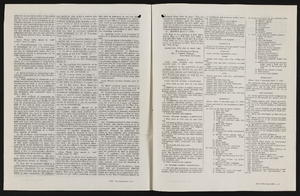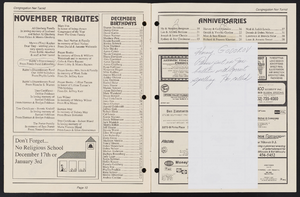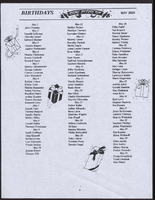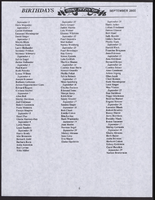Search the Special Collections and Archives Portal
Search Results
Henry and Anita Schuster Papers
Identifier
Abstract
Collection is comprised of correspondence, speeches, essays, meeting minutes, photographs, research materials, publications, press clippings, awards, and event programs (1941-2011) that document the life of Henry Schuster, and his work with his wife Anita. Materials are mainly related to the Holocaust and to Holocaust memory and survivor organizations (especially the Holocaust Survivor's Group of Southern Nevada, which the couple founded, and L’Œuvre de Secours aux Enfants). Genealogical information is also included, as well as records of Henry Schuster’s time in the U.S. Army and his studies at the Manhattan Technical Institute.
Archival Collection
Blanche Zucker-Bozarth Papers
Identifier
Abstract
The Blanche Zucker-Bozarth Papers document education advocate Blanche Zucker-Bozarth's volunteer work and activism in libraries, children's advocacy, and women’s clubs in Las Vegas, Nevada from 1963 to 2005. The collection includes records, newspaper clippings, and photographs from her political activism and fundraising initiatives in Southern Nevada. The collection also includes buttons, video tapes, and journal articles on child abuse prevention, as well as records from Zucker-Bozarth's term as president of the Mesquite Club in the 1980s.
Archival Collection

Sook-ja Kim, February 12, 1996 and April 6, 1996: transcript
Date
Archival Collection
Description
The Kim Sisters, composed of three sisters, Sook-ja, Ai-ja, and Mia, came from Korea to Las Vegas in February 1959. Their first contract in America was to perform at the Thunderbird Hotel for four weeks as part of the China Doll Revue, the main showroom program. This engagement led to a successful career. Their popularity reached was at its height at the end of the 1960s when they performed throughout the United States and Europe. Sook-ja Kim is the oldest of the sisters. After his sister Ai-ja died in 1987, Sook-ja teamed up with her two brothers and continued to perform until 1989. Now semi-retired from show business, with occasional performances in Korea, she is working as a real estate agent. In this interview, she talked about her childhood, her career, and the family she has built since coming to America. Sook-ja was born in 1941 in Seoul, Korea as the third child of seven in a musical family. Her father was a conductor and her mother, a popular singer. After the Korean War, her mother arranged to send the Kim Sisters to America. When they came to Las Vegas, there were virtually no Koreans in the area. They depended on each other to take care of themselves. Some of the difficulties they had to adjust to in American were language, food, and cultural differences. Over the span of almost forty years in America, Sook-ja became acculturated without discarding her ethnic identity of family priorities. Her life-long guiding principle has been to adopt certain American values while continuing to keep her cherished Korean ethnic values. Through their performances, the Kim Sister informed the audience about Koreans and their culture. As the oldest of the group, Sook-ja was entrusted the care of her sisters, and later her brothers, the Kim brothers. Once she settled in Las Vegas, she brought more than forty members of her extended family to the city, contributing to the growth of the Las Vegas Korean community.
Text
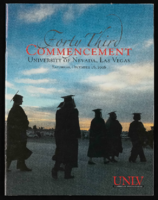
University of Nevada, Las Vegas (UNLV) 43rd commencement program
Date
Archival Collection
Description
Commencement program from University of Nevada, Las Vegas Commencement Programs and Graduation Lists (UA-00115).
Text
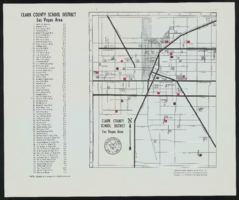
Mabel Hoggard: teaching materials
Date
Archival Collection
Description
Folder of materials from the Mabel Hoggard Papers (MS-00565) -- Educational work and legacy file. This folder includes teaching contracts, a Clark County School District Las Vegas Area map, teacher-student guidelines, newsletters, a conference booklet, a speech transcript, and other documents related to Mabel Hoggard's teaching career.
Mixed Content

